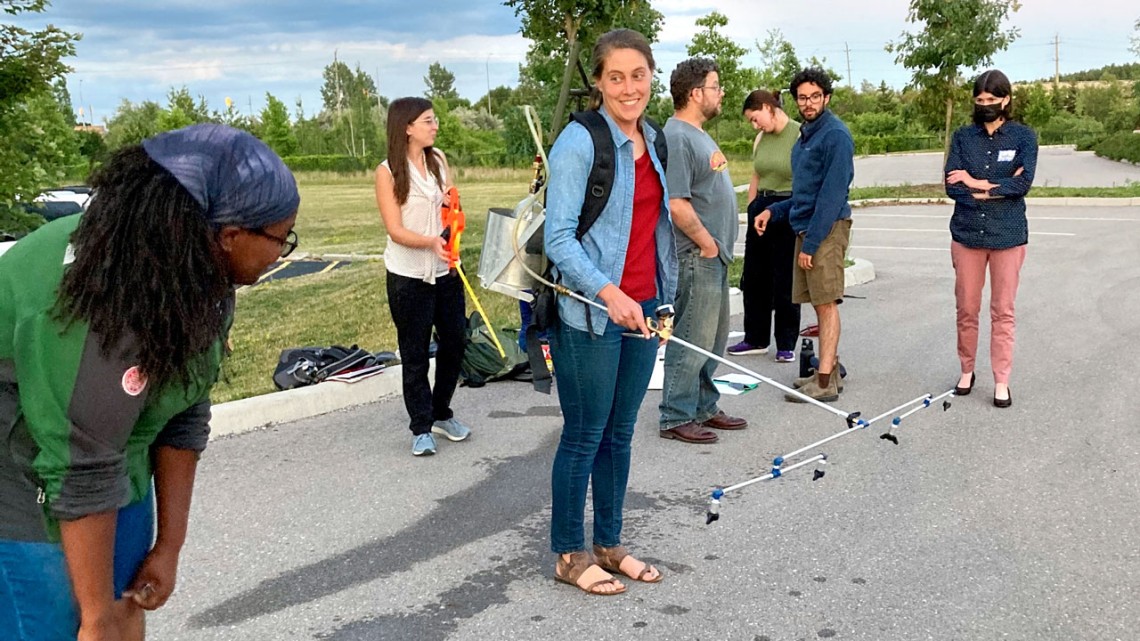
Doctoral students Aleah Butler-Jones '19, left, and Maria Gannett, M.S. '16 practice with other Cornell graduate students at a hotel parking lot the night before the weed competition.
Undergrads win Northeastern Weed Science Society contest
By Blaine Friedlander, Cornell Chronicle
Cornell’s undergraduate Weed Team won first place, while Megan Wittmeyer ’22 earned the top undergraduate individual award, at the Northeastern Weed Science Society Collegiate Weed Science Contest on July 27.
Held this year at Syngenta Canada’s Honeywood Research Facility at Plattsville, Ontario, the annual contest – suspended for two years due to the pandemic – featured 60 students from Cornell, Clemson University, North Carolina State University, Pennsylvania State University, Rutgers University, Virginia Tech and host school the University of Guelph.
In addition to Wittmeyer, the winning Cornell undergraduates were Lizzy Fitzgerald ’22, Michael Lovier ’24 and Rebecca Stup ’23.
“The competition was great and eye-opening to see how many graduate students and professors – participating from other schools – were Cornell alumni,” said Lovier, who spoke to many of the contestants, judges and scientists. “It was motivating to hear about their research and Cornell’s role in sparking that interest.”
In the contest, graduate and undergraduate students identified weeds at various growth stages and identified herbicide applications for different crops based on visual symptoms. The students calibrated sprayers and application speeds, and solved farming problems – while in the field and thinking on their feet – all without consulting a textbook.
“A highlight for me was the grower-problems section,” Fitzgerald said. “I really liked being able to combine everything we had studied and applying it to a real-world problem. It’s just like solving a puzzle.”
Before the team hit the crop fields, they practiced the night before by running sprayer calibrations (using water) at the hotel parking lot and conducting a weed-identification walking tour until sundown.
The students – with their gas cylinder and sprayer backpacks on – looked like Ghostbusters cruising through the hotel. “A lady at the lobby reception area looked shocked,” Lovier said. “Clearly backpack sprayers are not common to see.”
This summer, Wittmeyer has been working in Aurora, New York, with Larissa Smith ’98, M.S. ’06, a Syngenta research and development field scientist, by collecting data on new products. Smith gave her ample material to study for the contest.
In addition to her summer with Syngenta, Wittmeyer helps on her family’s dairy farm in North Collins, New York, near Buffalo, where they grow hay, corn and soy – and milk about 130 cows.
For the contest’s undergraduate team events, two teams from the University of Guelph earned second and third place.
Antonio DiTommaso, professor and chair in soil and crop sciences at the School of Integrative Plant Science (College of Agriculture and Life Sciences), and Lynn Sosnoskie, assistant professor in weed ecology at Cornell AgriTech (CALS) in Geneva, New York, serve as team advisers.
Team travel was funded by the School of Integrative Plant Science. The contest returns next year to North Carolina State University.
Get Cornell news delivered right to your inbox.
Subscribe
